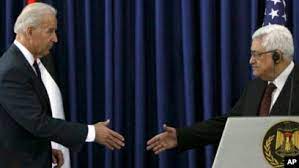The Palestinians still don’t get it. They refuse to comprehend their new, much diminished status in the world. They think that that “cause of Palestine” still is at the center of Arab attention. They still think they are in a position to command respect, to make demands and have those demands met, rather than have to plead for aid. They are now at the nadir of their standing in the Arab world. Four Arab states have ignored Palestinian desires, and have joined Israel in the Abraham Accords, normalizing ties with the Jewish state. Three of those states – the United Arab Emirates, Bahrain, and Morocco – have made deals with Israel involving trade, tourism, technology, agriculture, and security. The UAE alone has signed deals worth more than $1 billion with Israel, and also concluded a free-trade agreement with the Jewish state that, the UAE predicts, will within five years lead to $10 billion in bilateral trade.
What’s more, both the most populous Arab state, Egypt, and the richest Arab state, Saudi Arabia, cooperate closely with Israel on security matters. And the Saudi Crown Prince, Muhammad bin Salman, has made clear both his exasperation with the Palestinians — in 2018, he told Mahmoud Abbas to “just take whatever deal the Americans offer you” — and his readiness to consider joining the Abraham Accords, which could take place as soon as he becomes king. His father King Salman is 87, and in poor health.
Yet the Palestinians, as oblivious to reality as ever, had the never-ending audacity to prepare “five demands” that they presented to President Biden when he met with Mahmoud Abbas in mid-July. A report on those demands, written before the meeting, is here.
The Palestinian leadership will present five demands to US President Joe Biden during his upcoming visit to the region, senior Palestinian Foreign Ministry official Ahmed al-Deek told The Jerusalem Post on Sunday.
Deek expressed hope that the Biden administration would accept all the Palestinian demands. He called on Prime Minister Yair Lapid to immediately meet with Palestinian Authority President Mahmoud Abbas to revive the stalled Israeli-Palestinian peace negotiations.
Deek listed the demands as follows:
1.Restoration of a “political horizon” between Israel and the Palestinians.
Deek said that this was the most significant demand because it would entail “obliging the Israeli government to engage in serious negotiations and a peace process to end the occupation.” The Palestinians, he said, are ready to immediately resume the peace negotiations with Israel. “The Palestinians are the only ones who want to return to the negotiations,” Deek argued.
“What is preventing the Palestinians from resuming the peace negotiations is the absence of an Israeli peace partner. [Former Prime Minister Naftali] Bennett put the political process on hold and even boasted that there won’t be a political process with the Palestinians on the pretext that the coalition was weak. The Palestinians pay the price [both] when there’s a strong government in Israel and when there’s a weak one too.”
Ahmed al-Deek, and the other Palestinians, would like us to forget that it is the Palestinians, not Israelis, who have repeatedly walked away from peace negotiations that had been started with Israel. Yassir Arafat did it in 2000, when he didn’t like the most generous territorial compromise offered by Ehud Barak; it didn’t give Arafat everything he had demanded so in response, Arafat simply walked out. In 2008, Ehud Olmert made a similar offer, this one even more generous, and Mahmoud Abbas, finding that it did not meet all of his maximalist demands, pulled an Arafat, and simply walked away. In March 2011, Israeli Prime Minister Benjamin Netanyahu reportedly considered a temporary peace deal that would see a Palestinian state established within provisional borders, with future borders that could be negotiated at a later date, due to the Palestinians’ refusal to negotiate. But the Palestinians refused that offer as well.
Since then the Israelis have tried on numerous occasions to again start negotiations with the Palestinians, but the Palestinians keep insisting that first Israel had to agree to a withdrawal to the 1949 armistice lines (described demurely as the “1967 lines”), which Israel of course is not about to do. When another offer was made to the Palestinians to negotiate on the basis of the Trump Administration’s “Peace-To-Prosperity” plan in 2020, the Palestinians again refused. Yet here we have Ahmed Al-Deek presenting the Palestinians as the ones who have all along been so eager to negotiate, and the Israelis as the ones who have been the obstacle. No doubt counting on a kind of collective amnesia, Al-Deek wants us to accept his upside-down version of the truth.
Palestinians Demand That Biden Restore A ‘Political Horizon’ Between Israel and the Palestinians
Michael Loyman
